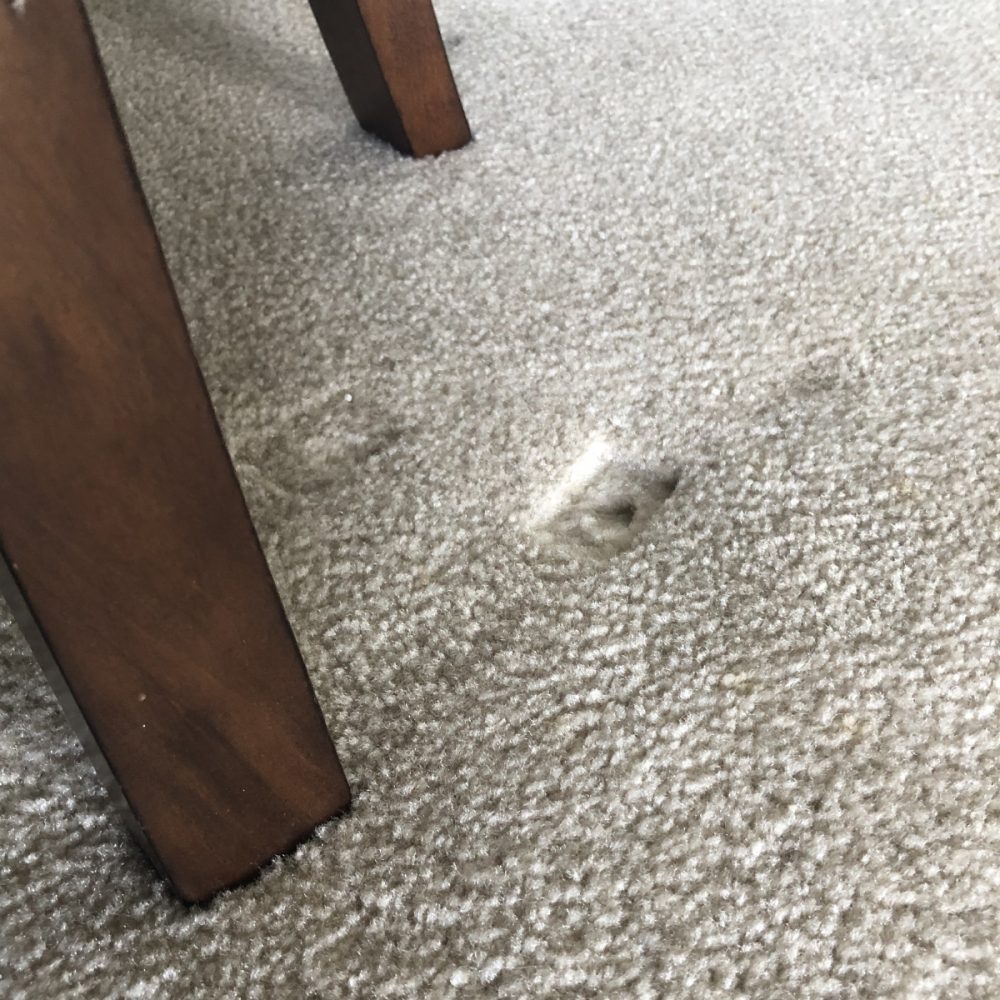Banish Carpet Dents: A Guide to Furniture Mark Prevention
Have you ever rearranged your furniture, only to be greeted by the ghosts of its former positions imprinted on your carpet? These indentations, a constant reminder of past décor choices, are a common frustration for homeowners. But what if you could avoid them altogether? This guide delves into the world of carpet protection, offering practical solutions to keep your floors looking their best.
Carpet dents, those telltale depressions left by furniture legs, are a natural consequence of pressure and time. The weight of furniture compresses the carpet fibers, causing them to lose their loft and resilience. Over time, these compressed areas become noticeable, detracting from the overall appearance of your room. This issue has plagued homeowners for as long as carpets and furniture have coexisted. The quest for a dent-free carpet is a timeless pursuit.
Protecting your carpet from furniture marks isn't just about aesthetics; it's about preserving your investment. Carpets are a significant expense, and preventing damage prolongs their lifespan. Addressing furniture marks early on can save you the cost and hassle of replacing or repairing your carpet down the line.
The most common culprit of carpet dents is heavy furniture, such as sofas, beds, and entertainment centers. The concentrated weight on the legs of these pieces exerts significant pressure on the carpet fibers, leading to noticeable indentations. Other factors, such as the type of carpet fiber and the underlying padding, can also influence the severity of the marks.
Understanding the mechanics of carpet indentation is the first step towards prevention. The density and resilience of your carpet fibers play a significant role. Denser, more tightly woven carpets are less prone to denting than looser, plusher varieties. The padding beneath your carpet also provides a crucial layer of support. High-quality padding distributes weight more evenly, minimizing the impact of furniture on the carpet fibers.
One simple method to minimize indentations is to periodically rotate your furniture. By shifting the weight distribution, you allow the carpet fibers to recover and prevent permanent compression. Using furniture coasters is another highly effective strategy. These small discs, placed under furniture legs, distribute the weight over a larger surface area, reducing the pressure on individual carpet fibers. Consider using furniture cups for heavier pieces. These cups provide a wider base of support, further dispersing the weight and protecting your carpet.
Benefits of Preventing Carpet Marks:
1. Enhanced Aesthetics: A dent-free carpet significantly improves the overall appearance of your room, creating a cleaner, more polished look.
2. Extended Carpet Lifespan: By preventing damage, you prolong the life of your carpet, saving you money in the long run.
3. Increased Home Value: Well-maintained carpets contribute to a higher perceived value of your home.
Action Plan:
1. Assess your current furniture layout and identify areas prone to denting.
2. Choose appropriate protective measures, such as coasters or cups.
3. Implement the chosen solution and monitor for effectiveness.
4. Adjust your strategy as needed.
Advantages and Disadvantages of Furniture Pads
| Advantages | Disadvantages |
|---|---|
| Prevent carpet dents | Can be unsightly if not chosen carefully |
| Prolong carpet life | May need to be replaced periodically |
| Relatively inexpensive | Can sometimes slip on smooth surfaces |
Best Practices:
1. Use high-quality carpet padding.
2. Rotate furniture regularly.
3. Utilize coasters or cups under all furniture legs.
4. Vacuum frequently to lift carpet fibers.
5. Address spills and stains promptly.
Real Examples:
1. Using furniture cups under a heavy sofa prevented noticeable indentations.
2. Rotating a bed every few months minimized visible marks.
3. Placing coasters under dining chairs protected the carpet in the dining area.
4. Using a high-quality carpet pad reduced denting under an entertainment center.
5. Regular vacuuming helped maintain carpet loft and resilience.
FAQ:
1. What are the best types of furniture coasters? - Durable materials like felt, rubber, or plastic.
2. How often should I rotate my furniture? - Every 3-6 months.
3. Can I remove existing carpet dents? - Sometimes, using ice cubes or a steamer.
4. What is the best type of carpet padding for dent prevention? - High-density foam padding.
5. How do I choose the right size furniture cups? - Measure the diameter of the furniture legs.
6. Are there specific coasters for different types of flooring? - Yes, some are designed for hardwood, tile, etc.
7. Can I make my own furniture coasters? - Yes, using materials like felt or cork.
8. What should I do if coasters scratch my floor? - Use coasters with a soft backing or place a protective layer beneath them.
Tips and Tricks: Consider using area rugs in high-traffic areas to further protect your carpet. Regularly vacuuming with a beater bar can also help lift carpet fibers and prevent compaction.
Protecting your carpet from furniture marks is a simple yet effective way to maintain the beauty and longevity of your floors. By implementing the strategies outlined in this guide, you can prevent those unsightly indentations and keep your carpets looking their best for years to come. Investing in preventative measures like coasters, cups, and regular furniture rotation is a small price to pay for the long-term benefits. Remember, a well-maintained carpet enhances the overall aesthetic of your home and contributes to its value. Take action today to safeguard your investment and enjoy a dent-free, pristine carpet for years to come. This proactive approach not only preserves the aesthetic appeal of your space but also extends the lifespan of your carpet, saving you money and hassle in the long run. So, embrace these simple yet effective strategies and enjoy the satisfaction of a beautifully maintained carpet.
Concise form 4 science chapter 2 notes your key to success
Unlocking knowledge a guide to contoh proposal kuliah tamu
Unlocking literacy the power of short stories for 4th graders textos cortos para ninos de cuarto grado














